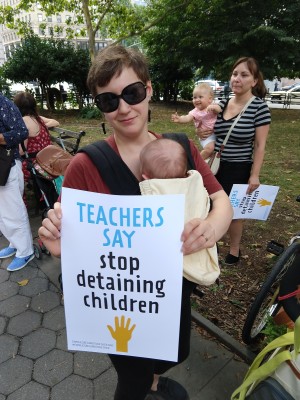
A few weeks ago I received an email from a former RFC beneficiary who I’ve stayed in touch with over the years. She contacted me to respond to the blogs my dad and I wrote about our thoughts on the current immigration crisis and family separations. She shared updates about her family, her thoughts on the blogs and sent me the link to her recent post on the topic.
After reading it, I asked her for permission to post it as an RFC guest blog. Like my father and me, she comes to this topic from a very particular perspective that I believe will resonate with other RFC beneficiaries and our broader community. I encourage you to read her piece and share your thoughts by commenting below – Jenn Meeropol
Guest blog by Rosa Squillacote
As a new parent and as the child of incarcerated parents, I haven't been able to read any of the articles about the families separated at the border. I can barely skim the headlines. It is horrifying, and cruel, and it is new, this targeted persecution. And it requires us to do more than gape or go numb.
I don't know much about the border, but I know about prisons, where we have been tearing families apart for years. And these stories all remind me of prison visits. My worst visit was the first time I saw my father after my parents were convicted. For the first year after their arrest they were held at a federal detention center. That facility was like what you see in movies -- talking on a phone looking through plexiglass windows. My mom got special visits during that year so a couple times we were able to go in and hug her. My father didn't, so I couldn't hug him until the first time my Oma (grandmother) took me to see him in prison after the trial. We were new and didn't know the rules of visitation yet, so we arrived late. I got to hug my dad for the first time in a year, and an hour later we had to leave. I was 13 and didn't understand. So I cried and I screamed, and the guards took me and my Oma away while my dad looked on and had to go back inside.
The guards let me and my Oma cry in the bathroom for a few minutes but then told us it was time to leave. She cried and asked if they had any humanity and they just kept saying visiting had ended and we should have come earlier. That visit broke something inside me that hasn't been fixed, that can't be fixed. It wasn't the last time a prison visit broke me, but it was the first I was aware of it happening. I was 13 and the state tore me, sobbing, away from my father. I hadn't been able to touch him in a year.
So I don't know what the families being separated at the border are going through. But I know something about the state taking away children from their parents. And there is nothing that can justify it. No act of any kind -- and don't mistake me, there are many people in prison who have committed serious crimes -- warrants that cruelty. It breaks you as a person, changes you deep down.
And of course the people at the border have not committed any serious offenses. They are looking for safety with their families. But bureaucracy can be used to punish people for nothing, for existing. Rule changes come out of nowhere and hit you hard. One of the constant questions of prison visits was whether there was a rule change for visitation you hadn't heard about in time -- a particular color of clothing or style of shoe may no longer be allowed. Once, they changed their policy so that underwire bras were not permitted. Several women were turned away before others got the idea to just cut the wire out of their bras in the bathroom. These random changes were ostensibly for safety but visitors always understood their real purpose: to make our lives harder, to punish us. These new border policies are also not about safety -- at least, not about guaranteeing safety. A new rule denying domestic violence survivors' claim for asylum is obviously not just a rule change. It is meant to kill women, to break families.
We have been separating families for years. But this is new, and it is worse, and I don't know what to do, what the right response is. Call representatives, yes. Fucking vote. Go to all the protests. Engage in civil disobedience. I don't know what enough is -- like I said, I can barely read the headlines. But all of us have a responsibility to stop this, to think of strategies and plans for how to keep this from continuing. Breaking apart families is the cruelest thing a state can do, and we are all complicit if we don't find a way to stop it.
The people carrying these orders out at the border are the animals. The people issuing the orders are monsters.
